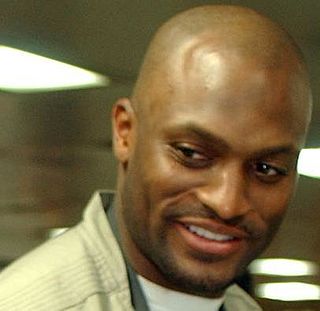
Amani Askari Toomer is an American former professional football player who spent his entire career as a wide receiver and punt returner for the New York Giants of the National Football League (NFL). He registered over 1,000 receiving yards each season from 1999 to 2003, was a member of the 2007 Giants team that won Super Bowl XLII, and holds Giants' club records with 9,497 receiving yards, 668 receptions, and 54 receiving touchdowns. He also returned 109 punts for 1,060 yards and three touchdowns. As a rookie in 1996, he led the NFL with an average of 16.6 yards on 18 punt returns.
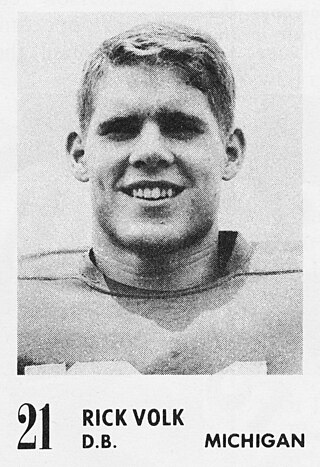
Richard Robert Volk is an American former professional football player who was a safety in the National Football League (NFL) for the Baltimore Colts, New York Giants, and Miami Dolphins. He retired with 38 career interceptions and 13 fumble recoveries, and totaled 574 yards on interception returns and 548 yards on punt returns.
Marquise Walker is an American former professional football player who was a wide receiver and punt returner who signed to play in the National Football League (NFL). He played college football for the Michigan Wolverines, setting many of the school's receiving records and becoming an All-American in 2001, when he led the Big Ten Conference in receptions. In 2004, Braylon Edwards surpassed most of his school records. In high school, Walker set several important New York State Public High School Athletic Association (NYSPHSAA) football records for receptions and reception yardage. All of these records have since been broken. Walker is remembered for a pair of spectacular one-handed catches during the 2001 NCAA Division I-A football season.

Dennis E. Franklin is a former professional American football player who was drafted by the Detroit Lions of the National Football League (NFL) in the 1975 NFL Draft. Prior to playing for the NFL he played college football as a quarterback at the University of Michigan from 1971 to 1974. He was the starting quarterback for the Michigan Wolverines from 1972 to 1974. He was recruited by Michigan after starring for the Massillon High School football team in Ohio. Franklin is known as Michigan's first black quarterback.

Gordon Granville Bell is an American former professional football player who was a running back, kickoff returner and punt returner who played for the Michigan Wolverines from 1973 to 1975, and professionally for the New York Giants (1976-1977) and St. Louis Cardinals (1978) of the National Football League (NFL).
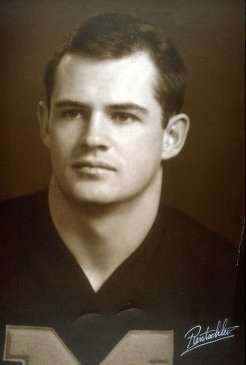
Jack David Clancy is an American former professional football player who was a wide receiver for the Miami Dolphins in 1967 and 1969 and for the Green Bay Packers in 1970. He played college football Michigan Wolverines from 1963 to 1966.
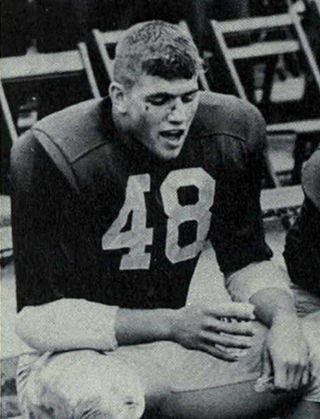
James R. Detwiler is a former American football halfback who was the 20th pick in the first round of the 1967 NFL Draft. Before this he had been an All-Big Ten Conference player for the Michigan Wolverines from 1964 to 1966.
Christopher L. Howard is a former professional American football running back who played in the National Football League (NFL) for the Jacksonville Jaguars. Howard had been drafted by the Denver Broncos in the fifth round of the 1998 NFL Draft. His professional football career was haunted by fumble troubles, which caused the Broncos to release him before he played a regular season game for them. Howard began to have fumble problems again when the Jaguars acquired and promoted him to a role as a regular player.
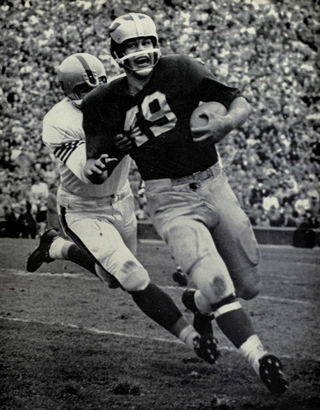
Robert J. Ptacek, Jr. is a former professional American and Canadian football player. He played college football at the halfback and quarterback positions for the University of Michigan from 1956 to 1958. He later played professional football in the National Football League (NFL) for the Cleveland Browns in 1959 and in the Canadian Football League (CFL) for the Saskatchewan Roughriders from 1960 to 1965. He was a CFL All-Star in 1964 as a defensive back and an All-Western Conference linebacker in 1961.

The 1964 Michigan Wolverines football team represented the University of Michigan in the 1964 Big Ten Conference football season. In their sixth year under head coach Bump Elliott, the Wolverines compiled a 9–1 record, won the Big Ten Conference championship for the first time since 1950, and defeated Oregon State in the 1965 Rose Bowl by a score of 34–7. The 1964 Wolverines defeated four teams ranked in the Top 10 in the AP Poll by a combined score of 82 to 17 and finished the regular season ranked No. 4 in both the AP and Coaches' polls. Although no post-bowl polls were taken in the 1964 season, Oregon State coach Tommy Prothro opined after watching game film from the Rose Bowl that the 1964 Wolverines were "the greatest football team he has ever seen."

Charles H. Ortmann was an American football player who played for the University of Michigan Wolverines from 1948 to 1950 and in the National Football League (NFL) for the Pittsburgh Steelers in 1951 and the Dallas Texans in 1952.
The 1965 Rose Bowl, played on January 1, 1965, was the 51st Rose Bowl Game. The Michigan Wolverines defeated the Oregon State Beavers by a score of 34–7. Michigan fullback Mel Anthony was named the Rose Bowl Player Of The Game.
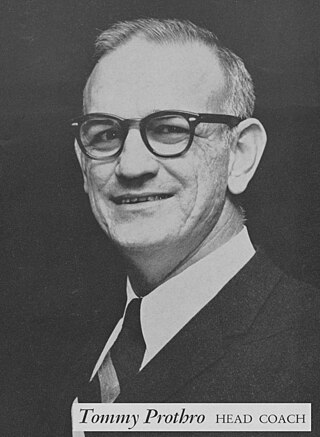
The 1964 Oregon State Beavers football team represented Oregon State University as a member of the Athletic Association of Western Universities (AAWU) during the 1964 NCAA University Division football season. It was the team's first season in the AAWU after competing as an independent for five years. Led by Tommy Prothro in his tenth and final season as head coach, the Beavers compiled an overall record of 8–3 with a mark of 3–1 in conference play, sharing the AAWU title with USC, and outscoring their opponents 149 to 124. Oregon State represented the conference in the Rose Bowl, where the Beavers lost to Michigan. It was the last bowl game appearance for the program until 35 years later when the 1999 team was invited to the Oahu Bowl. The team captains were linebacker Dick Ruhl and fullback Booker Washington.

The 1974 Michigan Wolverines football team was an American football team that represented the University of Michigan in the 1974 Big Ten Conference football season. In their sixth year under head coach Bo Schembechler, the Wolverines compiled a 10–1 record, outscored opponents 324 to 75, and were ranked #3 in final AP Poll. Michigan won the first ten games of the 1974 season in convincing fashion, including blowout victories over Colorado (31-0), Navy (52-0), Minnesota (49-0), and Purdue (51-0). In the final game of the season, #2 Michigan faced #3 Ohio State. The Wolverines lost by a score of 12-10, as place-kicker Mike Lantry missed a last-minute field goal that would have given Michigan a victory.

The 1963 Michigan Wolverines football team was an American football team that represented the University of Michigan in the 1963 Big Ten Conference football season. In its fifth year under head coach Bump Elliott, Michigan compiled a 3–4–2 record, tied for fifth place in the Big Ten, and outscored opponents by a total of 131 to 127. The highlight of the season was an upset victory over No. 2 Illinois led by Dick Butkus, the only loss suffered by the 1963 Illinois team.
The 1944 Michigan Wolverines football team represented the University of Michigan in the 1944 Big Ten Conference football season. Under seventh-year head coach Fritz Crisler, Michigan compiled a record of 8–2, outscored opponents 204 to 91, finished in second place in the Big Ten Conference, and was ranked #8 in the final AP Poll. The team opened the season with a victory over an Iowa-Pre-Flight team that won all of its remaining games and ended the season ranked #6 in the final AP Poll. The Wolverines then shut out four opponents: Marquette (14-0); Northwestern (27-0); Illinois (14-0); and Wisconsin (14-0). The team's two losses came against Indiana and an undefeated Ohio State team that was ranked #2 in the final AP Poll.
Mel Anthony is a former American football running back. He played football for the University of Michigan from 1962 to 1964 and was named the Most Valuable Player of the 1965 Rose Bowl after setting a Rose Bowl record with an 84-yard touchdown run. He played in the Canadian Football League (CFL) in 1965 for the Hamilton Tiger-Cats, in 1966 for the Montreal Beavers of the Continental Football League (COFL), and in the Midwest Football League in 1967 for the Ypsilanti Vikings.

Carl Davis Ward is a former American football player. He played college football as a halfback for the University of Michigan from 1964 to 1966 and professional football in the National Football League (NFL) for the Cleveland Browns and New Orleans Saints from 1967 to 1969.

The promotion of Bump Elliott to head coach in 1959 defined a historical era of the University of Michigan Wolverines football through 1968 when he resigned after that season. Michigan was a member of the Big Ten Conference and played its home games at Michigan Stadium during the Elliott years. During the 10 years in which Elliott served as head football coach, Michigan compiled a record of 51–42–2 (.547) and claimed one Big Ten championship, one Rose Bowl victory, and two Chicago Tribune Silver Football awards for the most valuable player in the Big Ten. However, the Wolverines finished higher than third place in the Big Ten only twice.
The 1964 Big Ten Conference football season was the 69th season of college football played by the member schools of the Big Ten Conference and was a part of the 1964 NCAA University Division football season.












